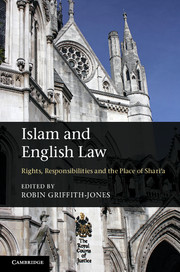Book contents
- Frontmatter
- Contents
- List of contributors
- List of abbreviations
- Preface
- Introduction
- Part I The Archbishop of Canterbury and shariʽa law
- Part II The Archbishop’s proposal for ‘transformative accommodation’
- Shariʽa and secular democracy: is Islamic law compatible with the European Convention on Human Rights?
- Legal pluralism: should English law give greater recognition to Islamic law?
- 7 Family law: current conflicts and their resolution
- 8 Islamic finance, alternative dispute resolution and family law: developments towards legal pluralism?
- 9 Judging Muslims
- 10 From Muslim migrants to Muslim citizens
- 11 Ontario’s ‘shariʽa court’: law and politics intertwined
- Accommodation or conflict: trajectories in the United Kingdom
- Part III Responsibilities and rights
- Part IV Prospect: equality before God and before the law
- Select bibliography
- Index of cases
- Index
- References
10 - From Muslim migrants to Muslim citizens
Published online by Cambridge University Press: 05 April 2013
- Frontmatter
- Contents
- List of contributors
- List of abbreviations
- Preface
- Introduction
- Part I The Archbishop of Canterbury and shariʽa law
- Part II The Archbishop’s proposal for ‘transformative accommodation’
- Shariʽa and secular democracy: is Islamic law compatible with the European Convention on Human Rights?
- Legal pluralism: should English law give greater recognition to Islamic law?
- 7 Family law: current conflicts and their resolution
- 8 Islamic finance, alternative dispute resolution and family law: developments towards legal pluralism?
- 9 Judging Muslims
- 10 From Muslim migrants to Muslim citizens
- 11 Ontario’s ‘shariʽa court’: law and politics intertwined
- Accommodation or conflict: trajectories in the United Kingdom
- Part III Responsibilities and rights
- Part IV Prospect: equality before God and before the law
- Select bibliography
- Index of cases
- Index
- References
Summary
Introduction
This chapter attempts some answers to the question whether the UK ought to adopt a pluralistic legal system. I will reflect upon various perspectives on the subject advanced in academic literature, and will suggest that the critical question underlying this debate is not simply about popular perceptions of Islam and Islamic law, both among Muslim migrants themselves who are now British citizens and in the non-Muslim majority population. It is in reality about the phenomenon of Muslims as permanent ‘features’ on the British societal landscape; their engagement or lack of it with the mainstream institutions of state, law and society; their rights and responsibilities as equal citizens; the commonalities and differences of Islamic law vis-à-vis the prevalent legal system; and the likely impact in the event of its recognition and application in this jurisdiction.
The question therefore is a much deeper and more complex one than meets the eye. The line of argument I propose (and have proposed for some time) is the following: the starting point of this discussion must be to develop a list of priorities where there is a real or perceived divergence of thought or action between British Muslims and the majority non-Muslim population, to interrogate each issue honestly and sincerely, and to explore possible mechanisms for reaching a consensual resolution. Unless there is the will to define and address the difficult issues confronting us, all parties to the debate will (as has been the case until now) fail to reach a satisfactory resolution.
- Type
- Chapter
- Information
- Islam and English LawRights, Responsibilities and the Place of Shari'a, pp. 157 - 175Publisher: Cambridge University PressPrint publication year: 2013



